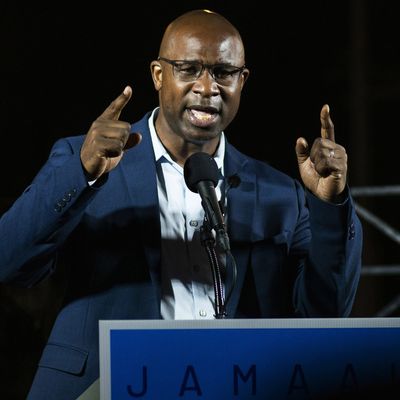
Jamaal Bowman had to wait nearly a month for confirmation by the Associated Press that his wide June 23 Election Night lead over veteran Democratic congressman Eliot Engel had survived the slow count of a huge raft of absentee ballots. But the AP call finally arrived today, making the 16th District’s Bowman the latest symbol of the steady transformation of New York City’s congressional delegation.
The Black 44-year-old Bronx middle-school principal running on a rigorously progressive message was a better fit for the Bronx-Westchester County district than the ten-term incumbent, the chairman of the House Foreign Affairs Committee best known for his unconditional support for Israel. And in a campaign that has inevitably been compared to Alexandria Ocasio-Cortez’s 2018 upset win over House Democratic Chairman Joe Crowley, Bowman was able to make Engel look out of touch with a district hit hard by both coronavirus and clashes between police and protesters just as voters began to vote, as my colleague Eric Levitz explained:
The 73-year-old congressman did not look much like his district, which is now majority nonwhite and one-third African-American. Engel had not faced a serious primary challenge in two decades, and his electioneering muscles had clearly atrophied: The congressman failed to intuit a political downside to hiding out in his D.C.-area home while a pandemic was ravaging his constituency. Weeks later, at a protest against police brutality, Engel got caught on a hot mic imploring the organizer of a news conference on police brutality to let him speak to the crowd — while explaining, repeatedly, “If I didn’t have a primary, I wouldn’t care.” In Bowman’s own account of the campaign, this gaffe was pivotal.
The contest was also joined by national political figures on both sides, with Bowman (originally recruited to run against Engel by Justice Democrats) endorsed by Bernie Sanders, Elizabeth Warren, and AOC, while the incumbent was backed by Hillary Clinton, Nancy Pelosi, the Congressional Black Caucus, and Governor Andrew Cuomo — not to mention AIPAC, for whom Engel’s defeat was a bitter setback. While Engel had a financial advantage, Bowman had all the intangibles working for him. Being a first-time candidate was no handicap at all.
After he brushes aside token Republican opposition in his heavily Democratic district, Bowman will join a freshman class of New York congressmen that includes Mondaire Jones, who won a primary for the open seat of retiring Congresswoman Nita Lowey in the suburban 17th District, and likely Ritchie Torres, who has a sizable lead in the Bronx-based 15th District in a race some feared would be won by homophobe and Trump-fancier Ruben Diaz Sr. Jones and Torres are considered solid progressives, and together become the first openly gay Black members of Congress. Torres also identifies as Latino.
As my colleague Sarah Jones observed after initial results on June 23 showed a good night for the left, change is coming fast in New York Democratic politics:
Machine politics is increasingly endangered in New York. For senior Democrats, this sets up a major challenge. Labor unions, who rely on Democratic incumbents to block assaults from the right, will have to reconsider their former calculations or risk looking aloof to the demands of the times. As inequality deepens, voters are seeking out candidates with bigger, more transformative ideas.
And AOC is going to have more hometown company in the next Congress.






























